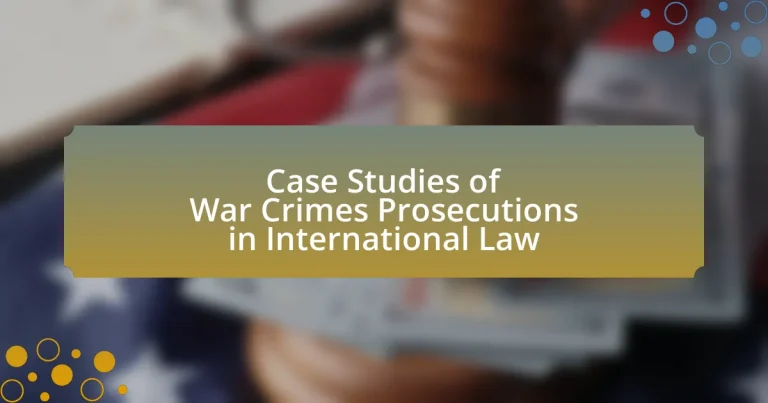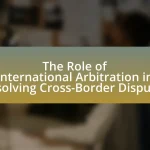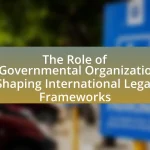The article focuses on case studies of war crimes prosecutions within the framework of international law, examining the legal definitions, implications, and historical precedents established by tribunals such as the International Criminal Court (ICC) and the International Criminal Tribunal for the former Yugoslavia (ICTY). It outlines the key elements that constitute war crimes, the importance of prosecuting these offenses for justice and accountability, and the challenges faced in such prosecutions, including jurisdictional issues and evidence collection. Notable case studies, including the Nuremberg Trials and recent ICC cases, illustrate the evolution of international law regarding war crimes and highlight best practices for enhancing prosecution effectiveness through international cooperation and robust legal frameworks.
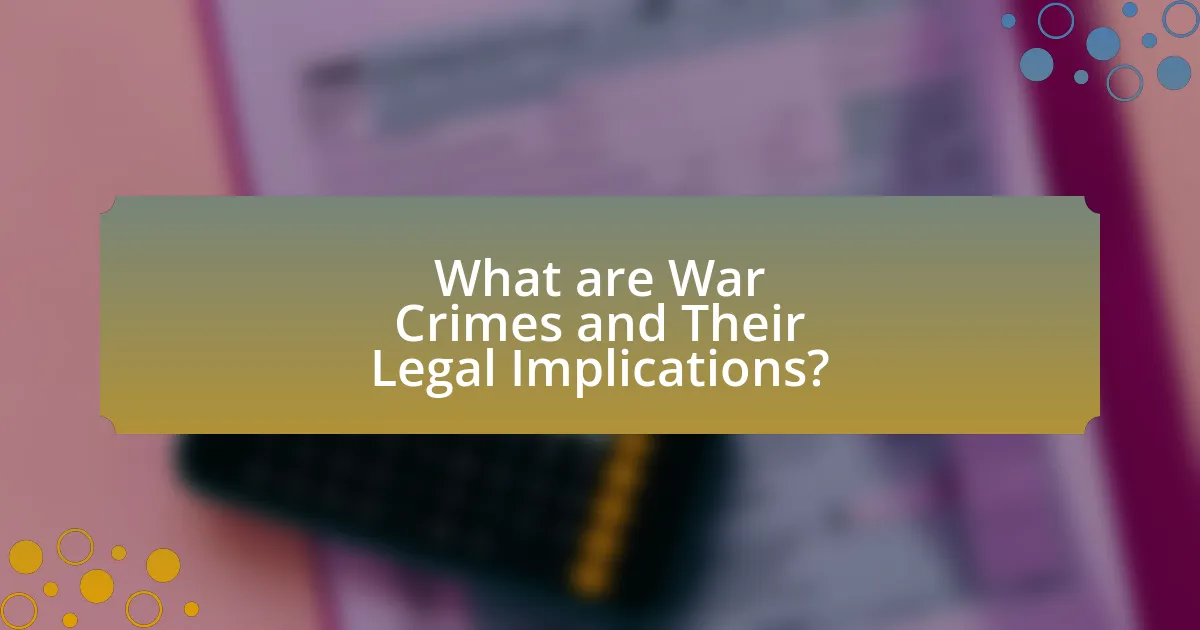
What are War Crimes and Their Legal Implications?
War crimes are serious violations of international humanitarian law that occur during armed conflicts, including acts such as willful killing, torture, and inhumane treatment of civilians or prisoners of war. The legal implications of war crimes involve prosecution under international law, particularly through tribunals like the International Criminal Court (ICC) or ad hoc tribunals established for specific conflicts, such as the International Criminal Tribunal for the former Yugoslavia (ICTY). These legal frameworks aim to hold individuals accountable for their actions, ensuring justice for victims and deterring future violations. The Nuremberg Trials post-World War II set a precedent for prosecuting war crimes, establishing that individuals, including state leaders, can be held criminally responsible for such acts.
How are war crimes defined in international law?
War crimes are defined in international law as serious violations of the laws and customs of war that occur during armed conflict. These violations include acts such as willful killing, torture, taking hostages, and intentionally directing attacks against civilians or civilian objects. The legal framework for war crimes is primarily established by the Geneva Conventions of 1949 and their Additional Protocols, as well as the Rome Statute of the International Criminal Court, which outlines specific acts that constitute war crimes and sets forth the responsibilities of individuals and states in prosecuting these offenses.
What are the key elements that constitute a war crime?
The key elements that constitute a war crime include the violation of the laws and customs of war, the perpetration of acts against protected persons or property, and the requirement of intent to commit such acts. War crimes are defined under international law, particularly in the Geneva Conventions and the Rome Statute of the International Criminal Court. Specific acts classified as war crimes include willful killing, torture, taking hostages, and intentionally directing attacks against civilian populations. The International Criminal Court (ICC) outlines these elements in its legal framework, emphasizing the necessity of both the act and the intent behind it to establish culpability.
How do different legal frameworks address war crimes?
Different legal frameworks address war crimes through a combination of international treaties, customary international law, and national legislation. The Geneva Conventions, particularly the Fourth Geneva Convention, outline the protections for civilians and the obligations of warring parties, establishing a legal basis for prosecuting war crimes. The Rome Statute of the International Criminal Court (ICC) further defines war crimes and provides a mechanism for international prosecution, emphasizing accountability for serious violations of international humanitarian law. Additionally, national legal systems may incorporate international law principles, allowing for domestic prosecution of war crimes, as seen in various countries that have enacted laws to comply with their obligations under international treaties. These frameworks collectively aim to ensure justice and deter future violations by holding individuals accountable for their actions during armed conflicts.
Why is the prosecution of war crimes important?
The prosecution of war crimes is important because it serves to uphold international law and ensure accountability for heinous acts committed during armed conflicts. By prosecuting individuals responsible for war crimes, such as genocide or crimes against humanity, the international community reinforces the principle that no one is above the law, thereby deterring future violations. Historical examples, such as the Nuremberg Trials following World War II, demonstrate that holding perpetrators accountable can contribute to justice for victims and promote reconciliation in post-conflict societies. Furthermore, the establishment of the International Criminal Court (ICC) has provided a permanent institution to address war crimes, emphasizing the global commitment to preventing impunity and protecting human rights.
What impact do war crimes prosecutions have on victims and societies?
War crimes prosecutions significantly impact victims and societies by providing a sense of justice and accountability. Victims often experience psychological relief and validation when perpetrators are held accountable, which can aid in their healing process. For instance, the International Criminal Tribunal for the former Yugoslavia (ICTY) has documented that survivors reported improved mental health outcomes following the prosecution of war criminals, as it acknowledged their suffering and reinforced their rights. Additionally, these prosecutions can promote societal healing and reconciliation by establishing a historical record of atrocities, thereby fostering a collective memory that discourages future violations. Research indicates that societies that pursue accountability for war crimes tend to experience lower rates of reoccurrence of violence, as seen in post-apartheid South Africa, where the Truth and Reconciliation Commission aimed to address past injustices and build a more cohesive society.
How do prosecutions contribute to international justice and accountability?
Prosecutions contribute to international justice and accountability by holding individuals accountable for war crimes and crimes against humanity, thereby deterring future violations. Historical examples, such as the Nuremberg Trials after World War II, established legal precedents that emphasized individual responsibility for atrocities, reinforcing the principle that no one is above the law. Additionally, the International Criminal Court (ICC) prosecutes individuals for serious offenses, promoting a global standard for justice and encouraging states to comply with international norms. These prosecutions serve not only to deliver justice for victims but also to foster a culture of accountability, which is essential for sustainable peace and reconciliation in post-conflict societies.
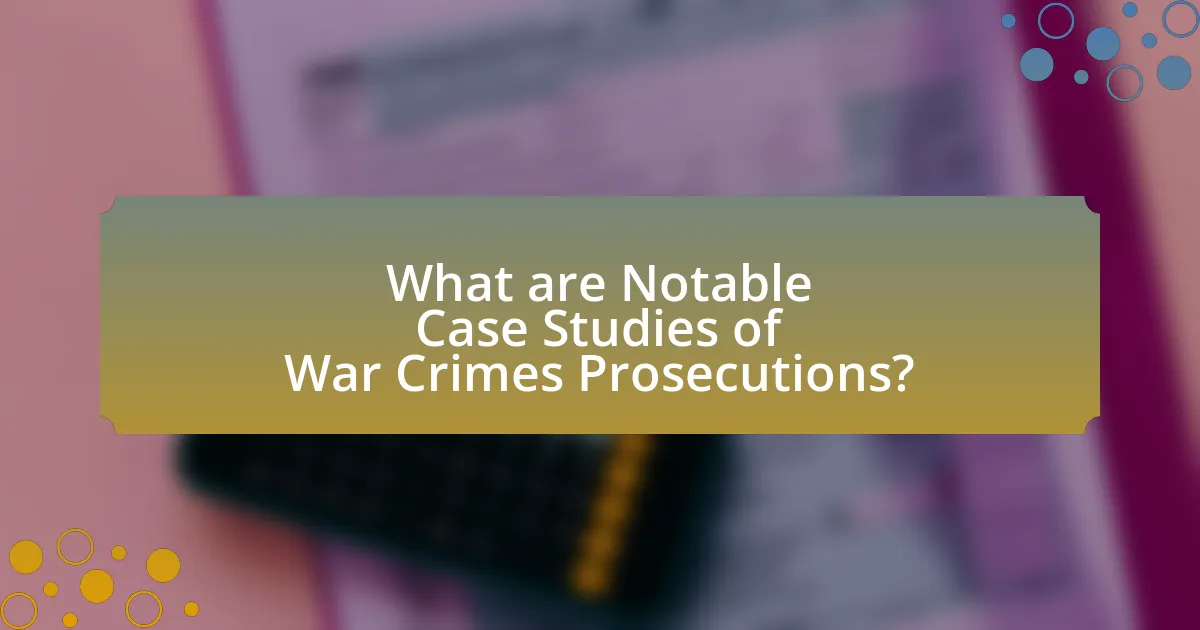
What are Notable Case Studies of War Crimes Prosecutions?
Notable case studies of war crimes prosecutions include the Nuremberg Trials, the International Criminal Tribunal for the former Yugoslavia (ICTY), and the International Criminal Court (ICC) cases against individuals like Thomas Lubanga and Jean-Pierre Bemba. The Nuremberg Trials, held after World War II, prosecuted key Nazi leaders for crimes against humanity, establishing a precedent for international law. The ICTY, established in 1993, addressed war crimes committed during the Yugoslav Wars, leading to significant convictions, including that of former Bosnian Serb leader Radovan Karadžić. The ICC has prosecuted individuals for war crimes in various contexts, with Lubanga being the first to be convicted in 2012 for enlisting child soldiers, and Bemba being convicted in 2016 for war crimes in the Central African Republic. These cases illustrate the evolution and enforcement of international law regarding war crimes.
What are some landmark cases in war crimes history?
Some landmark cases in war crimes history include the Nuremberg Trials, the Tokyo Trials, and the International Criminal Tribunal for the former Yugoslavia (ICTY). The Nuremberg Trials, held after World War II, prosecuted key Nazi leaders for crimes against humanity, establishing a precedent for international law. The Tokyo Trials addressed war crimes committed by Japanese leaders during the same conflict, further solidifying the legal framework for prosecuting such offenses. The ICTY, established in 1993, was the first tribunal to prosecute individuals for war crimes committed during the Balkan conflicts, emphasizing accountability for violations of international humanitarian law. These cases collectively shaped the development of international criminal law and set standards for future prosecutions.
How did the Nuremberg Trials shape modern war crimes law?
The Nuremberg Trials established foundational principles for modern war crimes law by holding individuals accountable for crimes against humanity, war crimes, and genocide. These trials introduced the concept that individuals, including state leaders, could be prosecuted for actions taken during wartime, thereby rejecting the defense of following orders as a valid justification for such crimes. The legal precedents set during the Nuremberg Trials, such as the definitions of war crimes and crimes against humanity, directly influenced subsequent international legal frameworks, including the Geneva Conventions and the establishment of the International Criminal Court. The trials also emphasized the importance of due process and fair trials in international law, shaping how future war crimes prosecutions are conducted.
What lessons were learned from the Yugoslav Tribunal?
The Yugoslav Tribunal taught several key lessons about international war crimes prosecution. Firstly, it demonstrated the importance of establishing accountability for war crimes, as it was the first international tribunal since Nuremberg to prosecute individuals for crimes against humanity, war crimes, and genocide. This accountability is crucial for justice and reconciliation in post-conflict societies. Secondly, the tribunal highlighted the necessity of robust legal frameworks and procedures to ensure fair trials, as seen in its efforts to uphold defendants’ rights while pursuing justice. Additionally, the tribunal underscored the significance of gathering credible evidence and witness testimonies, which are essential for successful prosecutions, as evidenced by the challenges faced in securing reliable evidence in complex conflict environments. Lastly, the tribunal illustrated the need for international cooperation and support, as its effectiveness relied on collaboration among states for arrests and evidence collection. These lessons continue to inform contemporary approaches to international criminal law and the prosecution of war crimes.
How have recent prosecutions evolved in response to contemporary conflicts?
Recent prosecutions have evolved to address contemporary conflicts by increasingly focusing on accountability for war crimes through international tribunals and domestic courts. This shift is evidenced by the establishment of the International Criminal Court (ICC) in 2002, which has prosecuted individuals for crimes such as genocide and crimes against humanity in various conflicts, including those in Sudan and the Democratic Republic of the Congo. Additionally, national jurisdictions have begun to assert universal jurisdiction, allowing them to prosecute war crimes committed abroad, as seen in cases in Spain and Germany against Syrian officials. These developments reflect a growing commitment to uphold international law and ensure justice for victims of contemporary conflicts.
What role did the International Criminal Court play in recent cases?
The International Criminal Court (ICC) has played a crucial role in prosecuting war crimes and crimes against humanity in recent cases, particularly in regions like Ukraine and Sudan. The ICC has initiated investigations into alleged war crimes committed during the ongoing conflict in Ukraine, responding to requests from member states and the United Nations. In Sudan, the ICC has continued its efforts to hold accountable individuals responsible for atrocities in Darfur, issuing arrest warrants for key figures. These actions underscore the ICC’s mandate to ensure accountability and justice for victims of serious international crimes, reinforcing its position as a central institution in the global fight against impunity.
How have national courts addressed war crimes in their jurisdictions?
National courts have addressed war crimes through the prosecution of individuals under domestic laws that incorporate international humanitarian law. For instance, countries like Germany and the United States have utilized their legal systems to prosecute war crimes committed during conflicts, such as the Nuremberg Trials following World War II and more recent cases involving individuals accused of war crimes in Iraq and Afghanistan. These prosecutions often rely on principles of universal jurisdiction, allowing states to prosecute offenders regardless of where the crime occurred, as seen in Spain’s prosecution of former Chilean dictator Augusto Pinochet. Additionally, national courts have increasingly collaborated with international tribunals, such as the International Criminal Court, to ensure accountability for war crimes, demonstrating a commitment to uphold international legal standards.
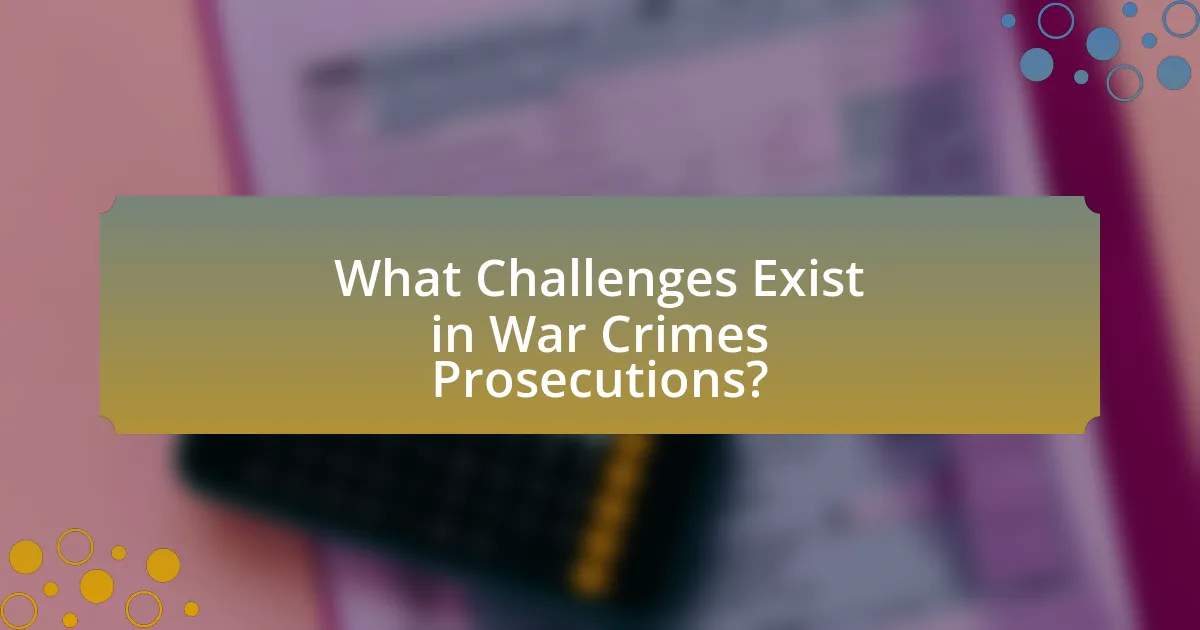
What Challenges Exist in War Crimes Prosecutions?
War crimes prosecutions face significant challenges, including issues of jurisdiction, evidence collection, and political interference. Jurisdictional challenges arise when determining which court has the authority to prosecute, as seen in cases like the International Criminal Court’s (ICC) limitations on prosecuting non-member states. Evidence collection is often hindered by the chaotic environments of conflict zones, making it difficult to gather reliable testimonies and documentation, as highlighted in the prosecution of war crimes in the former Yugoslavia, where many witnesses were intimidated or killed. Political interference can obstruct legal processes, as governments may refuse to cooperate with international tribunals, exemplified by the lack of support for ICC investigations in countries like Sudan and Libya. These factors collectively complicate the pursuit of justice for war crimes.
What are the main obstacles faced in prosecuting war crimes?
The main obstacles faced in prosecuting war crimes include issues of jurisdiction, gathering evidence, political interference, and the protection of witnesses. Jurisdictional challenges arise when determining which court has the authority to prosecute, especially when crimes occur in multiple countries or involve non-state actors. Gathering evidence is often difficult due to the chaotic environments in which war crimes occur, making it hard to collect reliable testimonies and documentation. Political interference can hinder prosecutions, as governments may be reluctant to cooperate or may actively obstruct legal processes to protect their interests. Additionally, the safety of witnesses is a significant concern, as they may face threats or retaliation for testifying, which can deter individuals from coming forward. These factors collectively complicate the effective prosecution of war crimes, as seen in various historical cases such as the International Criminal Tribunal for the former Yugoslavia, where these challenges were prevalent.
How do political considerations affect war crimes prosecutions?
Political considerations significantly influence war crimes prosecutions by determining which individuals are targeted for accountability and the extent to which legal actions are pursued. For instance, powerful nations may shield their allies from prosecution to maintain strategic relationships, as seen in the reluctance of the United States to support the International Criminal Court’s investigations into war crimes committed by its allies. Additionally, political stability in a region can affect the willingness of governments to cooperate with international tribunals; countries experiencing internal conflict may prioritize national interests over international legal obligations, leading to selective enforcement of justice. Historical examples, such as the limited prosecutions following the Rwandan Genocide, illustrate how political dynamics can hinder comprehensive accountability, as influential political actors may evade justice due to their power or connections.
What issues arise regarding evidence and witness testimony?
Issues regarding evidence and witness testimony in war crimes prosecutions include reliability, credibility, and the potential for bias. Witnesses may have varying recollections influenced by trauma or external pressures, leading to inconsistencies in their accounts. Additionally, evidence may be difficult to obtain due to the chaotic nature of conflict zones, resulting in gaps or lack of documentation. The International Criminal Court (ICC) has highlighted that witness intimidation and fear of reprisal can further compromise the integrity of testimony. Furthermore, cultural differences and language barriers can affect the interpretation of evidence, complicating the judicial process. These factors collectively challenge the pursuit of justice in war crimes cases.
How can these challenges be addressed to improve outcomes?
To address the challenges in war crimes prosecutions and improve outcomes, enhancing international cooperation and legal frameworks is essential. Strengthening collaboration among nations can facilitate evidence sharing and witness protection, which are critical for successful prosecutions. For instance, the International Criminal Court (ICC) has established mechanisms for cooperation that allow states to assist in investigations and arrests, thereby increasing the likelihood of holding perpetrators accountable. Additionally, improving the legal definitions and standards of evidence in international law can lead to more consistent and fair trials. Research indicates that jurisdictions with clear legal frameworks and robust support systems for victims and witnesses see higher conviction rates, as demonstrated in cases like the tribunals for the former Yugoslavia.
What strategies have been proposed to enhance the effectiveness of prosecutions?
Strategies proposed to enhance the effectiveness of prosecutions include improving the collection and preservation of evidence, increasing collaboration among international and national legal bodies, and providing specialized training for prosecutors. Enhanced evidence collection methods, such as utilizing technology for digital evidence and witness protection programs, have been shown to strengthen cases significantly. Collaboration between jurisdictions can lead to more comprehensive investigations, as seen in cases like the International Criminal Court’s work with national courts. Specialized training equips prosecutors with the necessary skills to handle complex war crimes cases, thereby increasing conviction rates and ensuring justice is served effectively.
How can international cooperation be strengthened in war crimes cases?
International cooperation in war crimes cases can be strengthened through the establishment of unified legal frameworks and enhanced information-sharing mechanisms among nations. By adopting international treaties such as the Rome Statute of the International Criminal Court, countries can create a cohesive legal basis for prosecuting war crimes. Furthermore, initiatives like the International Criminal Police Organization (Interpol) facilitate the exchange of intelligence and evidence, which is crucial for effective investigations. Historical examples, such as the collaboration during the Nuremberg Trials, demonstrate that coordinated efforts among nations lead to successful accountability for war crimes.
What Best Practices Can Be Implemented in War Crimes Prosecutions?
Best practices that can be implemented in war crimes prosecutions include ensuring the independence and impartiality of judicial bodies, utilizing comprehensive evidence collection methods, and fostering international cooperation among states and organizations. Independent and impartial judicial bodies, such as the International Criminal Court, enhance credibility and fairness in prosecutions. Comprehensive evidence collection methods, including the use of forensic science and witness protection programs, improve the reliability of testimonies and documentation. International cooperation, exemplified by joint investigations and shared intelligence, strengthens the capacity to prosecute war crimes effectively, as seen in cases like the prosecution of war crimes in the former Yugoslavia.
